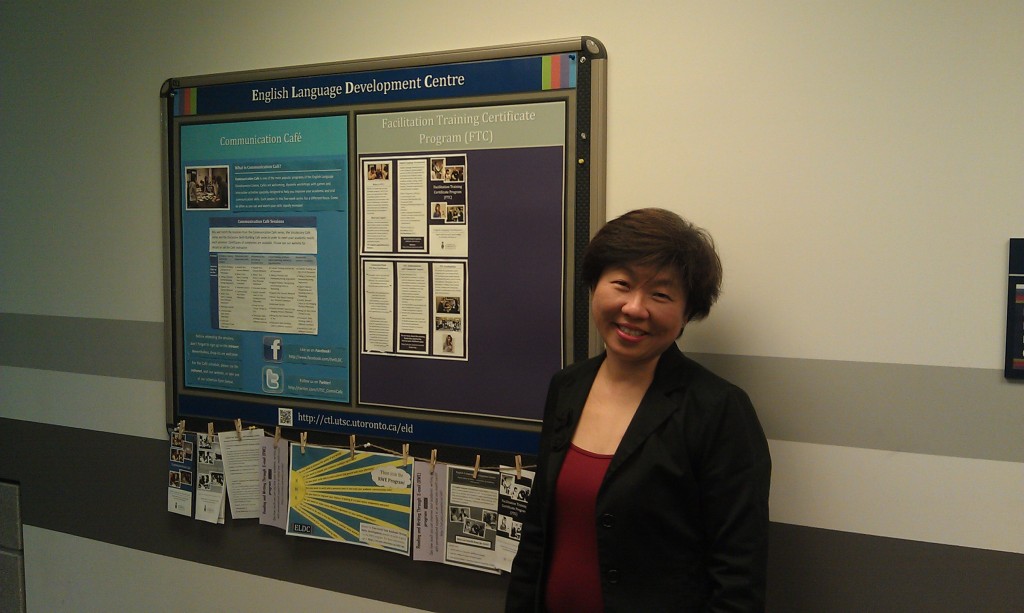Dr. Elaine Khoo, English Language Development Centre
Dr. Elaine Khoo, Coordinator, English Language Development Centre
As the Coordinator of the English Language Development Centre at UTSC, Senior Lecturer Elaine Khoo’s mission is to help students develop skills in academic communication to succeed in their courses – not only writing skills, but speaking, presentation, and critical thinking skills that when put together, give students the capability to tackle their assignments without anxiety. Two of the ELDC’s programs, Communication Café and RWE (Reading and Writing through Email), began in 2005 as initiatives within the Writing Centre as part of the Centre for Teaching and Learning. In 2011, the ELDC separated into its own space. Through these initiatives, students have the opportunity to work with Khoo’s team of instructors in both one-on-one (through RWE), and in group workshop (for Communication Café) settings.
In Communication Cafés, students learn through scaffolded activities in a games-based approach, to give students practice speaking in English in what Khoo calls a “GPA-free”, low-risk environment. Cafés are set at a schedule that allows students to get started at the beginning of term and make progress by the time they write their mid-term exams. “Nobody is born speaking academic English,” Khoo says, and learning to communicate in an academic environment is particularly stressful for students who are not native English speakers. While many communications issues manifest in writing assignments, “the inability to write is the tip of the iceberg”. With practice in activities such as receiving a card with an extraordinary idea, then pitching it in a presentation, students focus on critical speaking tasks to construct an argument. In Communications Cafés, however, students take the game at face value and don’t feel as inhibited as they would feel about speaking up in class.
In the RWE program, students work on their writing by communicating with an ELDC writing instructor by email, combining 40 minutes of reading with 20 minutes of writing each day for two four-week cycles. “In RWE we want students to write every day”, Khoo says, “because even just 20 minutes a day adds up.” Students meet regularly with their tutor in person to engage in critical discussion. Students who enroll in RWE begin to think of these emails as a way to improve their expression and communicate their thoughts to someone significant, rather than as a chore or busy work. By the end of the program, they write better and would have gained confidence in their own ideas and feel more comfortable approaching their professors and TAs.
Khoo was awarded the Joan E. Foley Quality of Student Experience Award in 2009 in recognition of her innovative program design and dedication to improving the student experience at UTSC. She stresses that language issues are a temporary problem. This mindset that helps students change the way they orient themselves to their academic work. In recent years she has increasingly worked in partnership with faculty, to visit classes and speak to students about the ELDC’s programs. She says that faculty report that they can tell who in their class has worked with the ELDC because the changes are so evident. For her, the most important goal is to “give students a voice to help cross the threshold of fear and anxiety.” If we make our pedagogy more inclusive we can build community in courses and improve critical thinking, and students will feel integrated and that they belong.”
What challenges do you see as most pressing for UofT students?“For students who face initial language- and culture-related challenges as they transition into the rigorous and demanding academic environment at UofT, they need to be able to overcome these challenges quickly enough so that they can keep up with their course demands and be active members of the academic community. There is no course where students do not need good Academic English and critical thinking skills. We need to help facilitate this very difficult transition for these students.”
How have students responded to your programming?“They can make enormous progress in a short time. For instance, one international student who received a late acceptance after being on a waiting list latched on to RWE right away, and was able to score 100% on her first midterm. That student gained confidence and went on to do well. I have seen students’ writing go from a D to a B just in one semester. The Communication Cafés resonate so much with students that many voluntarily train through the Facilitator Training Certificate Program at ELDC to become peer facilitators. ”
What do you think faculty might be surprised to learn about their students?“Students love to bring their diverse experiences and passions into their learning context, and when given the opportunity to customize a bit of the learning material for themselves and their peers through collaboration, students would throw themselves into the task and enjoy it. Such interactions help build community in our courses.”
What could faculty do to support students in their courses?“Be inclusive when designing and conducting our courses. Be cognizant that students coming from diverse backgrounds would have different levels of language proficiencies and academic communication abilities. Thus scaffolding tasks, keeping in mind that students come to us with a very wide range of language proficiencies and familiarity with academic tasks, and creating conditions for students to work collaboratively to support each other will help make learning not such an isolated anxiety-filled activity for some students. What is considered critical thinking here can be very different from some students’ cultural and educational experience.
Communication Café: ctl.utsc.utoronto.ca/eld/commcafe
Reading and Writing Through Email: ctl.utsc.utoronto.ca/eld/rwe
Alumni Award Recipients, 2009: awards.alumni.utoronto.ca/viewer/view/484
